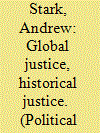| Srl | Item |
| 1 |
ID:
175291


|
|
|
|
|
| Summary/Abstract |
Wedges and frames, two much-studied strategies of American political combat, are generally thought to be partisan weapons, meant to manipulate voters into making trade-offs that favor the political actor wielding them. My inquiry here explores whether there exists anything comparably schematic to wedges and frames at work in attempts by American politicians not to polarize but to find consensus, not to cater to extremes but moderate them. Despite the seeming paucity of such efforts in American public discourse, there is one such common and as-yet untheorized scheme, which uses the two issue positions involved in wedges to overcome the ill effects of reframing and the two value dimensions involved in reframing to overcome the ill effects of wedges. I elaborate this discursive structure by examining its presence in a number of American political debates, showing how it differs from other contemporary normative-theoretic frameworks for understanding compromise in American politics.
|
|
|
|
|
|
|
|
|
|
|
|
|
|
|
|
| 2 |
ID:
115197


|
|
|
|
|
| Publication |
2012.
|
| Summary/Abstract |
The debates over global and historical justice much preoccupy contemporary political theory. Yet they have not been analyzed in tandem. And this, despite the fact that a number of theoretical frameworks, principal among them contractarianism and utilitarianism, configure arguments in both debates. In this essay, I show that such arguments, as advanced by either side in each of the two debates, all rest on a set of patterned assumptions about the nature of the self. Specifically, I argue, the debates over historical and global justice resemble each other as parallel contests over the physical, meta-social, metaphysical and social natures of the self. At their cores, the debates over historical and global justice thus display a common and symmetrical structure. I will also show that certain conceptions of the self underlying both the anti-historical justice and the anti-global justice positions are mutually inconsistent. Similar contradictions do not beset the pro-historical and pro-global justice positions.
|
|
|
|
|
|
|
|
|
|
|
|
|
|
|
|